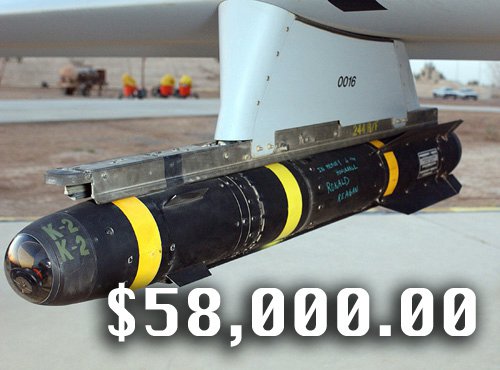By Zaher Wahab
The recent NATO summit in Lisbon officially declared that NATO troops will be withdrawn from Afghanistan and replaced by Afghan security forces by 2015. But participants were quick to point out that the date was "aspirational," "transitional" and conditions-based rather than absolute. Also, the Obama administration plans to conduct a strategic review of the Afghan imbroglio in early December, although Washington hawks have already hinted that there would be no major changes in the war on Afghanistan.

An AGM-114 Hellfire missile hung on the rail of an US Air Force (USAF) MQ-1L Predator Unmanned Aerial Vehicle (UAV) is inscribed with, "IN MEMORY OF HONORABLE RONALD REAGAN." and costs 58,000 USD.
The war, in its tenth year, is the longest in U.S. history -- and one of the costliest in terms of lives and money. This year has been the deadliest and most expensive yet, with 479 Americans killed and thousands maimed or scarred for life. About 1,300 Afghan civilians have been killed and countless wounded as collateral damage. The war is costing American taxpayers $8 billion per month or $1.1 million per soldier annually. It has cost $330 billion since 2001. The U.S. and 43 other countries are waging a brutal, full-spectrum war using tanks, 150,000 troops and that many private military contractors, bombers, drones, chemicals and more on a country whose people had little to nothing to do with 9/11 and where there may be just 50 to 100 al-Qaida members. Night raids, assassinations, house demolitions, humiliation, collecting biometric information on men, massive air assaults, imprisonment and torture are the routine. Yet according to the Afghan organization Safety Office, the insurgents control more than half of the country and have a presence in every one of the 34 provinces. This is a national resistance, not just a bunch of crazed fanatics resisting "modernization."
While the military-industrial-media-terrorism complex keeps escalating the violence, others urge de-escalation and alternatives to war. A national girga (assembly) consisting of 1,600 Afghan men and women last June authorized the Karzai government to pursue a rapid end to hostilities and reconcile with the opposition. President Hamid Karzai has selected a 70-member High Council of Peace, including women, for such a task. Feeling public pressure, Karzai told The Washington Post that he would like to see an end to the menacing of civilians, withdrawal of occupation forces to their bases and an end to occupation.
A recent Asia Foundation survey showed that 83 percent of Afghans want national reconciliation, peace and reintegration. More telling, a survey by the International Council on Security and Development in Helmand and Kandahar provinces, the main theaters of the bloody war, found that 92 percent of men are unaware of the 9/11 attacks on the U.S. and do not understand why foreign troops are in Afghanistan.
A majority of people in the U.S. and NATO countries clearly oppose the war on Afghanistan too, as do some of their governments. Furthermore, recent reports by four reputable organizations such as the Afghanistan Study Group, the Carnegie Endowment for International Peace, the London-based Institute for International Strategic Studies, the Council on Foreign Relations, and the New World Strategies Coalition as well as independent journalists, scholars and citizens all conclude that the Afghan adventure is wrong, a stalemate, extremely costly, counterproductive, wasteful and unsustainable. Never mind the moral and legal aspects of the war. They all urge peace, reconciliation, diplomacy and development. Early this year, at least 130 members of Congress said so too.
President Barack Obama and the warriors in Washington must heed the voices of Americans and the cries of Afghans. During this holiday season, numerous Americans lack food, health care, warmth, housing, quality education and/or jobs. Countless Americans are dealing with post-traumatic stress disorder due to the privatized, outsourced and invisible war. Afghanistan has been turned into a wasteland, and made polarized, torn apart, criminalized, gangsterized and impoverished beyond belief. It is ranked near the bottom on the human development index. Destitute but fiercely proud and independent, Afghans resist and the country will remain "the graveyard of empires."
I've seen how America can be a force for good. In the masters degree program for teacher education faculty, men and women from different ethnoracial, religious, linguistic and regional groups together master modern pedagogy, knowledge of subject matter, computer literacy, English and research skills. They learn to trust, respect, help and like each other. They collaborate as colleagues on academic and nonacademic issues. They reconnect with the international intellectual community. They begin to see possibilities for themselves and their tormented country. They start dreaming, and they hope and work for a better and normal tomorrow.
Let us hope that sanity, rationality and enlightened self-interest will prevail and our government, including Oregon's congressional delegation, will end the war, invest in Afghanistan's education, agriculture, health, housing, communication, transportation, resource development, civil society and state building; ensure the country's sovereignty and territorial integrity; stabilize the region; and foster America's security and geopolitical interests.
Zaher Wahab teaches at Lewis & Clark College and helps rebuild higher education in Afghanistan.



